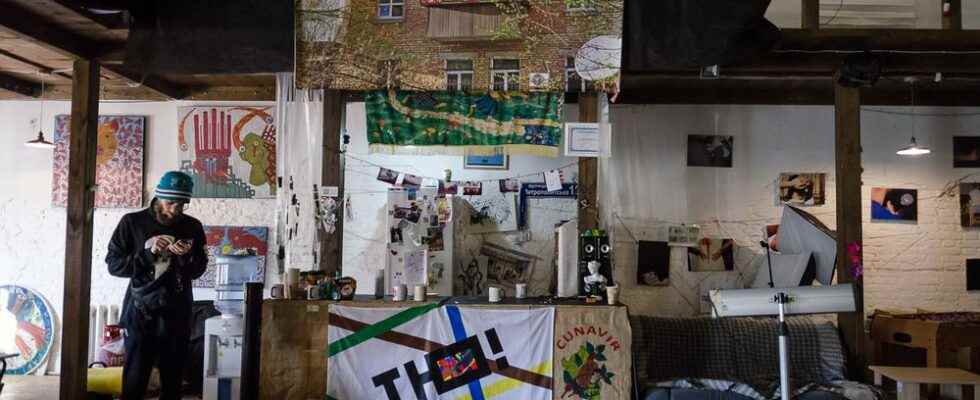They were together at school, but now find themselves on opposite sides, as Russia occupies eastern Ukraine and bombs the whole country. Masha Pronina, 31, and Denis Pohrebnoe, 30, grew up in Donetsk, at the time an industrial and wealthy city in Donbass, the Ukrainian mining basin. In the spring of 2014, when the war against pro-Russian insurgents sponsored by Moscow broke out, the couple, barely in their twenties, decided to flee their hometown.
Eight years later, Masha and Denis live in Mariupol, a town in southern Donetsk Oblast. Only ten kilometers separate them from the front line and from a whole world that has changed without them. “Here, my friends join the Ukrainian army, says Denis. Over there, my old classmates are fighting on the other side, some have good jobs at the MGB [les services de sécurité de Donetsk]. For them, we are only ‘khokhly’ [terme péjoratif pour parler des Ukrainiens].”
Territories that have built their separation
After eight years of war, the face of these territories has changed. In 2014, pro-Russian insurgents proclaimed the Republics of Luhansk (LNR) and Donetsk (DNR), gradually creating all the attributes of a state: their own administrations, flags and passports. Russian is the “state language” and the ruble, the currency in circulation. While the two self-proclaimed republics are real information black holes, for the past few weeks international media reports have been reaching us from Donetsk, which is trying to manipulate its image. Where the statues of Lenin fell in Kiev, thanks to the demonstrators of Maidan, the communist leader still stands in the heart of the capital of Donbass.
Beyond the institutions, the inhabitants have also changed. Once one of the most populated regions of Ukraine – and one of the richest for the oblast of Donetsk – the separatist Donbass has been emptied of its population, from five to two million inhabitants. Nearly a million and a half of them left for Ukraine and about a million took refuge in Russia at the start of the conflict. “The people who stayed did not necessarily do so for ideological reasons, but pragmatic ones”, analyzes Anna Colin Lebedev, researcher specializing in post-Soviet societies.
A life was organized on both sides of the front line, which the inhabitants could cross easily until March 2020. The crossing points, set up within the framework of the Minsk agreements, were closed by Ukraine and then the separatists to fight the Covid-19 epidemic. The latter have not reopened the majority of them.
“A Family War”
At the same time, since 2019, Moscow has carried out a policy of distributing passports: more than 600,000 people have thus taken Russian nationality in the Donbass, 2.5 million in Crimea, according to the Ukrainian authorities. Masha’s mother is one of them: fed up with the propaganda of Russian television, she fled to Russia at the start of the conflict. “For me, it’s a family war,” laments Masha. Once a month, this artist from Mariupol still calls her family on Skype. “But I don’t have the strength anymore, they tell the overlay of what they hear on Russian TV and think I’ve been brainwashed,” says Masha.
In Moscow, her mother bought her a bicycle to try to bring her to Russia. It’s been rusting for a few years now. Denis’ father, too, has changed tack. “A top level pro-Russian”, according to his son. This doctor spent the first years of the war caring for children affected by the bombardments and nurtured an intense hatred for Ukraine.
Denis Pohrebnoe, 30, lives in Mariupol after growing up in Donetsk, eastern Ukraine.
Clara Marchaud (L’Express)
Not only has the population of Donbass changed, but that of the rest of Ukraine as well. “Ukrainian society today is more uniform in its perception of Russia,” notes Anna Colin Lebedev. A recent study by the Kyiv Democratic Initiatives Foundation Ilko Koutcheriv attests to this change. In 2012, only 20% of the Ukrainian population believed that joining NATO was a good way to preserve national security. Today, it is half the population. In parallel, the demand for a military union with Russia fell from 30 to 8%.
Dmytro Chychera, 45, a well-known activist from Mariupol, who founded a staunchly pro-Ukrainian cultural center, sees the change with the generations. “My son, for example, is 20 years old and has grown up all his life with the war. He sees the consequences of it, he even hears it”, regrets Dmytro, as comfortable in Ukrainian as in Russian. For the past few days, the bombardments have been heard again, where the situation had been calm for several years.” It would not occur to him to go to Saint Petersburg for sightseeing, explains the activist, speaking of his son. He sees Russia only as the country of the aggressor.” Difficult for him to think of the reintegration of these territories, which are today so different from the rest of the country.
“Ukrainian society refuses to think about the loss of Donbass, because it would be 14,000 dead from the conflict for nothing, says Anna Colin Lebedev. But there is great mistrust towards the populations of Donbass, who are not seen as victims. , but as traitors.” Especially since these inhabitants have been fed Russian propaganda for eight years. In Kiev, only rare voices dare to think this paradox out loud: it would result in accepting that Ukrainian sovereignty has no value. “It will be a long job, which will require a lot of resources, energy and nerves, but in time we will get there”, continues to hope Dmytro.
